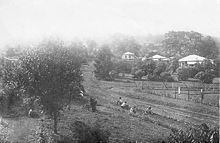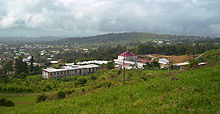Buea
| Buea | ||
|---|---|---|
|
|
||
| Coordinates | 4 ° 9 ' N , 9 ° 14' E | |
| Basic data | ||
| Country | Cameroon | |
| Sud-Ouest | ||
| ISO 3166-2 | CM-SW | |
| height | 1095 m | |
Buea is a city in western Cameroon , near the Cameroon Mountain in the Fako district in the Sud-Ouest region , of which it is the provincial capital. It is located at around 1000 meters above sea level and has around 52,000 inhabitants (2005 estimate) and is located in the settlement area of the Kpe ( Bakwiri , Wakweli ), a Bantu-speaking ethnic group on the south-eastern slope of the Cameroon Mountain.
The tea cultivation is an important branch of the local economy.
The University of Buea was the only Anglophone university in Cameroon until the University of Bamenda was founded .
The non-profit association Pro Climate International, supported by GIZ , is based in Buea . a. Offers ecotourism (e.g. guided hikes). Its aim is to offer the local population alternative sources of income through sustainable tourism and thus to contribute to poverty reduction and nature conservation. Buea is also the main location of the Naigahelp - Organization for Africa Aid .
history
Before the German conquest, Buea was a large settlement of the Bakweri, who had settled as farmers on the fertile slopes of the Cameroon Mountain since the 18th century. The German colonial administration saw the place as a serious obstacle to the expansion of colonial trade and plantation economy on the mountain slopes. In October 1891 the officer Karl von Gravenreuth undertook a military expedition against Buea. He fell in battle, but the place was destroyed by the members of the expedition.
After the establishment of the German protection force in Cameroon , Buea was again the target of a military action. It was temporarily occupied by the military in December 1894 and razed to the ground by Captain Hans Dominik in order to break any will to resist. Many residents were shot. The events surrounding the campaigns have engraved themselves deeply in the collective memory of the Bakweri. Kuva, the general of Buea, died on the run and is revered as a hero because of his victory from 1891 until today. The expulsion of the population from the previous settlement area was sealed in a forced contract.
The expropriation and expulsion of the population created the basis for the relocation of the administrative headquarters of the German colony of Cameroon to Buea in 1901 under Governor Jesko von Puttkamer . As the seat of the governorate, it experienced a rapid expansion. a. by building the governor's palace (so-called " Puttkamer-Schlößchen ").
During the First World War , Buea was occupied by British troops and from 1919 was the seat of the British mandate administration. In 1924 the expropriated German companies were able to buy back their plantations at a London auction. After 1933, plantations on the Kamerunberg became an experimental field for a future National Socialist colonial economy .
climate
Due to the proximity to the Cameroon Mountain, humid, Atlantic air rains down over Buea. With 203 rainy days a year, Buea is one of the rainiest places in the world.
Attractions
- The former governor's palace now serves as the secondary residence of the Cameroonian president.
- Bismarck fountain (1899) in front of the post office
- German cemetery
sons and daughters of the town
- Victor Anomah Ngu (1926-2011), medical doctor
- Kurt Raaflaub (* 1941), ancient historian
- Clinton N'Jie (born 1993), football player
Individual evidence
- ↑ Archive link ( Memento of the original from May 15, 2014 in the Internet Archive ) Info: The archive link was inserted automatically and has not yet been checked. Please check the original and archive link according to the instructions and then remove this notice.
- ↑ http://www.freiburg-postkolonial.de/Seiten/Moehle-Kamerun276.htm





